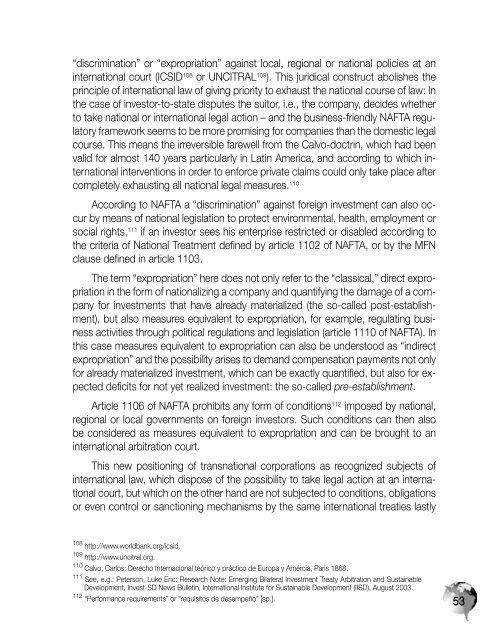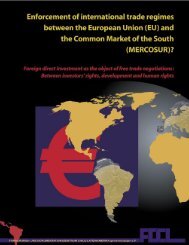Download - FDCL
Download - FDCL
Download - FDCL
Create successful ePaper yourself
Turn your PDF publications into a flip-book with our unique Google optimized e-Paper software.
“discrimination” or “expropriation” against local, regional or national policies at an<br />
international court (ICSID 108 or UNCITRAL 109 ). This juridical construct abolishes the<br />
principle of international law of giving priority to exhaust the national course of law: In<br />
the case of investor-to-state disputes the suitor, i.e., the company, decides whether<br />
to take national or international legal action – and the business-friendly NAFTA regulatory<br />
framework seems to be more promising for companies than the domestic legal<br />
course. This means the irreversible farewell from the Calvo-doctrin, which had been<br />
valid for almost 140 years particularly in Latin America, and according to which international<br />
interventions in order to enforce private claims could only take place after<br />
completely exhausting all national legal measures. 110<br />
According to NAFTA a “discrimination” against foreign investment can also occur<br />
by means of national legislation to protect environmental, health, employment or<br />
social rights, 111 if an investor sees his enterprise restricted or disabled according to<br />
the criteria of National Treatment defined by article 1102 of NAFTA, or by the MFN<br />
clause defined in article 1103.<br />
The term “expropriation” here does not only refer to the “classical,” direct expropriation<br />
in the form of nationalizing a company and quantifying the damage of a company<br />
for investments that have already materialized (the so-called post-establishment),<br />
but also measures equivalent to expropriation, for example, regulating business<br />
activities through political regulations and legislation (article 1110 of NAFTA). In<br />
this case measures equivalent to expropriation can also be understood as “indirect<br />
expropriation” and the possibility arises to demand compensation payments not only<br />
for already materialized investment, which can be exactly quantified, but also for expected<br />
deficits for not yet realized investment: the so-called pre-establishment.<br />
Article 1106 of NAFTA prohibits any form of conditions 112 imposed by national,<br />
regional or local governments on foreign investors. Such conditions can then also<br />
be considered as measures equivalent to expropriation and can be brought to an<br />
international arbitration court.<br />
This new positioning of transnational corporations as recognized subjects of<br />
international law, which dispose of the possibility to take legal action at an international<br />
court, but which on the other hand are not subjected to conditions, obligations<br />
or even control or sanctioning mechanisms by the same international treaties lastly<br />
108<br />
http://www.worldbank.org/icsid.<br />
109<br />
http://www.uncitral.org.<br />
110<br />
Calvo, Carlos: Derecho Internacional teórico y práctico de Europa y Amércia, Paris 1868.<br />
111<br />
See, e.g.: Peterson, Luke Eric: Research Note: Emerging Bilateral Investment Treaty Arbitration and Sustainable<br />
Development, Invest-SD News Bulletin, International Institute for Sustainable Development (IISD), August 2003.<br />
112<br />
“Performance requirements” or “requisitos de desempeño” [sp.].<br />
53









